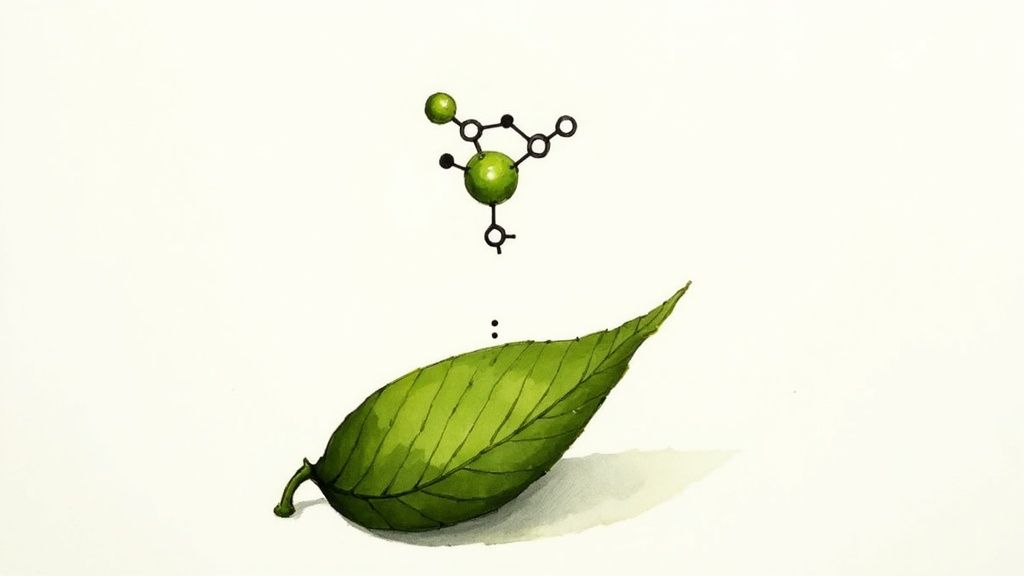What is Matcha Tea?

Matcha tea, a vibrant green powder, is more than just a fashionable drink; it's an integral part of Japanese culture and offers a wealth of health benefits. Unlike traditional green teas, where the leaves are steeped and discarded, matcha is made by grinding whole tea leaves into a fine powder. This means you consume the entire leaf, absorbing all its nutrients. This key difference is fundamental to understanding the many advantages of matcha.
From Shade to Sip: The Journey of Matcha
The matcha journey begins weeks before harvest, when the tea plants are shielded from direct sunlight. Similar to how some delicate fruits are protected on the tree, this shading slows the plant's growth and boosts chlorophyll production. As a result, the leaves develop a vibrant green color and a higher concentration of amino acids, contributing to matcha's unique flavor and nutritional profile. For instance, the increased chlorophyll isn't just for aesthetics; it also enhances matcha's detoxifying properties. This careful cultivation process sets matcha apart from other green teas, leading to its enhanced benefits.
Traditional Preparation and Cultural Significance
Traditionally, matcha is prepared in a special bowl using a bamboo whisk. Hot, but not boiling, water is added to the matcha powder and whisked briskly to create a frothy, vibrant beverage. This mindful process is a central element of the Japanese tea ceremony, a ritual emphasizing harmony and respect. This ceremony showcases matcha's cultural significance in Japan, elevating it beyond a simple drink into a symbol of tradition and tranquility. Even outside this formal setting, preparing and enjoying a cup of matcha can offer a moment of peaceful reflection and a connection to centuries of tradition. This rich history and cultural context further enhance matcha's appeal and benefits.
Beyond the Basics: Matcha's Advantages
The shaded growth and whole-leaf consumption contribute to matcha's potent concentration of beneficial compounds. From increased energy to improved mental clarity, matcha's advantages are numerous and well-documented. This naturally leads us to explore the specific health benefits that make matcha a true standout in the world of tea.
Antioxidant Power
Matcha tea's rich history and cultural significance are fascinating, but its true power lies in its remarkable health benefits. A primary advantage of matcha is its exceptional antioxidant capacity, a direct result of the unique cultivation and preparation methods we've explored.

Catechins: The Antioxidant Powerhouse
Matcha is rich in catechins, plant compounds with potent antioxidant properties. These compounds combat free radicals, unstable molecules that can harm cells and contribute to aging and chronic diseases. Free radicals can be likened to rust on a car, gradually degrading the body's systems over time. Antioxidants, like the catechins in matcha, act as a protective shield, preventing this damage. One particular catechin, epigallocatechin gallate (EGCG), is abundant in matcha and is considered a key contributor to its health benefits.
Matcha vs. Other Teas: A Clear Winner
While other green teas contain antioxidants, matcha boasts a significantly higher concentration. This is because you ingest the entire leaf, unlike traditionally steeped teas where the leaves are discarded. Consequently, you consume a far greater quantity of beneficial compounds, including those potent catechins. For example, studies indicate that matcha's EGCG content can be up to 137 times higher than in some green tea varieties. This difference significantly contributes to matcha's heightened advantages compared to its steeped counterparts. The shading practice further amplifies the concentration of these vital antioxidants.
Beyond EGCG: A Complex Blend of Antioxidants
While EGCG often steals the spotlight, matcha offers a complex blend of other antioxidants, working together to create a synergistic effect that promotes overall health. These antioxidants collaborate to combat oxidative stress and support various bodily functions, meaning matcha's benefits extend beyond simply fighting free radicals. This potent combination makes matcha a valuable addition to any diet aimed at improving well-being. For a deeper dive into matcha's properties, you might find The Health Benefits of Matcha Tea an interesting read. This discussion of antioxidant power leads us naturally to the next benefit: how this antioxidant richness translates into improved energy and focus.
Energy and Focus Benefits
Following our discussion of antioxidant power, we arrive at another key advantage of matcha: its unique ability to provide sustained energy and enhanced focus without the jitters often associated with coffee. This stems from the synergistic relationship between two of matcha's key components: caffeine and L-theanine.
The Dynamic Duo: Caffeine and L-theanine
Like other teas, matcha contains caffeine. However, the caffeine in matcha interacts differently with the body due to the presence of L-theanine, an amino acid known for promoting relaxation and mental clarity. Consider caffeine as the accelerator and L-theanine as the steering wheel. Caffeine provides the energy boost, while L-theanine helps regulate its release, preventing a sudden surge and subsequent crash. This results in a smoother, more sustained energy release compared to coffee's often jarring jolt.
Sustained Energy Without the Jitters
Imagine riding a bicycle with only an accelerator and no steering. The ride would be jerky and uncontrolled. Similarly, consuming caffeine without L-theanine can lead to jitters, anxiety, and an energy crash. Matcha's combination of caffeine and L-theanine, however, provides a balanced and controlled release of energy, fostering sustained focus and concentration without these unpleasant side effects. This unique synergy is one of matcha's most compelling advantages for those seeking a natural and effective cognitive boost.
A Calming Focus
L-theanine also increases alpha brain wave activity, which is associated with a relaxed yet alert state. While caffeine delivers the energy, L-theanine helps calm the mind, promoting focus and clarity. This combination is especially beneficial for tasks requiring sustained attention. This synergistic effect is another reason why many prefer matcha over coffee for enhancing productivity and cognitive function. This exploration of energy and focus naturally leads us to consider matcha's potential role in weight management.
Weight Management
Building on our discussion of energy and focus, we now turn to another advantage of matcha tea: its potential contribution to weight management. Matcha is not a miracle weight-loss solution, but it can be a helpful tool within a comprehensive healthy lifestyle. This benefit arises from several factors, including its effects on metabolism and its ability to promote fat burning.

Boosting Metabolism
Matcha has been found to increase thermogenesis, the body's rate of heat production. This process requires energy and therefore burns calories. Think of it like stoking a furnace; the more you stoke it, the more fuel it burns. Similarly, matcha can "stoke" your metabolism, leading to a higher calorie expenditure. Incorporating matcha into your routine can therefore help your body burn more calories, even while at rest, contributing to weight management efforts.
Enhancing Fat Burning
The advantages of matcha extend to its ability to enhance fat oxidation, the breakdown of fatty acids for energy. Studies suggest that matcha can increase fat burning during exercise by up to 25%. For example, if you typically burn 100 calories from fat during a workout, adding matcha could boost this to 125 calories. While not a dramatic weight-loss solution on its own, this boost can contribute to weight loss over time, especially when combined with a healthy diet and regular exercise.
Managing Cravings
Matcha can also promote a sense of fullness and satiety, which can be helpful in managing cravings and preventing overeating. Its fiber content further contributes to this feeling of fullness, providing additional support for weight management. Incorporating matcha into your diet can thus boost metabolism, enhance fat burning, and promote satiety, helping you achieve your weight management goals. This discussion of weight management transitions smoothly into the benefits of matcha for mental clarity.
Mental Clarity
Our discussion of matcha's role in weight management segues neatly into another important advantage: its positive impact on mental clarity and stress reduction. This benefit isn't just anecdotal; it's grounded in matcha's unique composition and its effect on brain function.

Enhanced Cognitive Function
As mentioned previously, matcha contains L-theanine, an amino acid known for its calming properties. L-theanine works in synergy with caffeine to improve cognitive function. Instead of the jittery energy sometimes experienced with coffee, matcha promotes a focused, calm alertness. This means matcha can enhance concentration, improve memory, and sharpen reaction time. Imagine trying to thread a needle with shaky hands; it's nearly impossible. Matcha, metaphorically speaking, helps steady those hands, allowing for greater precision and focus in both physical and mental tasks. This enhanced cognitive function can be particularly valuable for students, professionals, or anyone seeking to improve mental performance.
Stress Reduction
L-theanine also promotes alpha brain wave activity, associated with a relaxed state of awareness. This means matcha can reduce stress and promote calmness without causing drowsiness. Think of it as a gentle wave washing over you, calming the mind's turbulent waters. This calming effect, combined with the sustained energy from caffeine, creates a balanced mental state, perfect for navigating the daily stresses of life. This makes matcha a compelling option for natural stress management.
A Holistic Approach to Mental Well-being
The antioxidants in matcha, especially EGCG, also exhibit neuroprotective properties, safeguarding the brain from damage and supporting overall brain health. This long-term benefit adds another dimension to matcha's advantages, contributing to overall cognitive well-being. This combination of enhanced cognitive function, stress reduction, and neuroprotective properties makes matcha a powerful tool for supporting mental clarity and promoting a sense of calm focus throughout the day. This leads naturally into a discussion of practical ways to incorporate matcha into your daily life.
How to Include Matcha in Your Diet
Having explored matcha's numerous benefits, the question naturally arises: how can you integrate this nutritional powerhouse into your daily routine? While traditional matcha tea preparation is a beautiful and time-honored practice, matcha's advantages extend far beyond the teacup. Its versatility makes it easy to enjoy its unique flavor and reap its numerous benefits in various creative ways.

Beyond the Bowl: Creative Matcha Creations
One simple way to expand your matcha horizons is to experiment with different beverages. A matcha latte, for example, is a delicious and popular alternative to traditional matcha tea. Simply whisk matcha powder into warm milk (dairy or non-dairy) and sweeten to your liking. This creamy concoction offers a gentler introduction to matcha's sometimes earthy flavor while still delivering its potent benefits. Matcha smoothies are another excellent way to incorporate matcha into a quick and nutritious breakfast or snack. Blending matcha with fruits, vegetables, and your chosen liquid creates a refreshing drink packed with vitamins, minerals, and antioxidants. This versatility makes exploring matcha's advantages a truly enjoyable experience.
Culinary Adventures with Matcha
Matcha's uses are not limited to beverages. Its vibrant green color and unique flavor make it a surprisingly versatile ingredient in various culinary creations. Matcha can be added to baked goods like cakes, muffins, and cookies, imparting a subtle earthy note and a beautiful green hue. This means you can even enjoy the benefits of matcha in your desserts! You can also incorporate matcha into savory dishes, adding a unique depth of flavor to sauces, dressings, and even noodles. This unexpected versatility opens up a world of culinary possibilities.
Matcha as a Functional Food Supplement
Matcha can also be used as a functional food supplement, providing an extra boost of nutrients to your diet. You can simply add a teaspoon of matcha powder to yogurt, oatmeal, or even a protein shake to enhance its nutritional value. This is a quick and easy way to enjoy matcha's benefits without requiring extensive preparation. Adding matcha to your morning oatmeal, for instance, not only provides a vibrant green boost but also infuses your breakfast with antioxidants, starting your day on a healthy note.
Choosing the Right Matcha
When incorporating matcha into your diet, choosing high-quality matcha powder is crucial. Look for a vibrant green color, a fine texture, and a fresh, slightly sweet aroma. This ensures you're maximizing matcha's advantages. Different grades of matcha exist, with ceremonial grade being the highest quality, ideal for traditional tea preparation. Culinary grade matcha, while slightly less vibrant in color, is perfect for baking and cooking. Depending on your intended use, you can select the matcha grade that best suits your needs. To learn more about matcha and discover even more creative ways to enjoy its benefits, visit matcha-tea.com and embark on your own matcha journey. Explore the rich history, diverse recipes, and cultural insights this website offers, and unlock the full potential of this remarkable tea.
